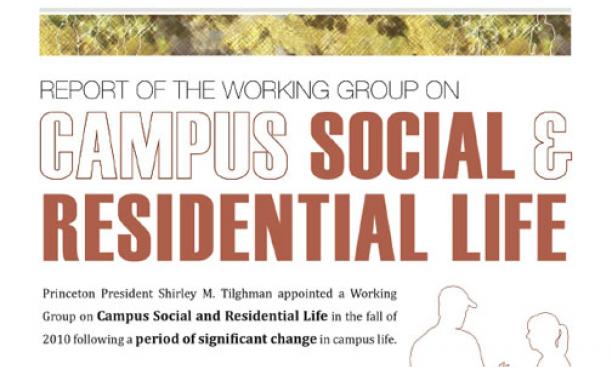


For all its variety, undergraduate social and residential life at Princeton has two defining features: the six residential colleges that are home to freshmen and sophomores and several hundred upperclassmen; and the eating clubs on Prospect Avenue, to which more than two-thirds of juniors and seniors belong. Together the clubs and colleges, which had their genesis in the second half of the 19th and 20th centuries, respectively, have shaped the Princeton experience of a generation of students, and today enjoy an increasingly close relationship, symbolized by the recent introduction of shared meal plans.
In contrast, Greek-letter national organizations have never been an integral part of Princeton’s culture, having been explicitly banned in 1853, based on faculty and trustee concern over “their small size..., cliquishness, and (in this pre-Civil War era) their increasing division of the student body along sectional lines.” Fraternities and sororities did not reappear at Princeton until the 1980s, and by then the colleges and clubs had filled the void created by their 19th-century proscription. Today, they lack the institutional recognition and physical infrastructure that Greek-letter organizations typically enjoy, but nonetheless enroll some 15 percent of undergraduates as members. Their presence is controversial on campus: Some contend that they are incompatible with Princeton’s unique organization of undergraduate social and residential life and the values that we as a University uphold, while others maintain that they meet a number of genuine needs, such as fostering interclass connections, and should be granted official standing.
Last year I convened a 13-member working group to identify ways of enhancing undergraduate social and residential life and, among other questions, to determine what role, if any, Greek-letter organizations should play at Princeton. After taking the pulse of the University, the working group, which included a number of past and present fraternity and sorority members, concluded that Greek-letter organizations should be neither banned nor recognized but that freshmen be prohibited from affiliating with them. Additionally, all students would be barred from “conducting or having responsibility for any form of rush in which freshmen participate.” After further consultation, and with the strong support of the trustees, I have decided to accept the working group’s recommendations but to defer their implementation until the fall of 2012, allowing time for a committee of students, faculty, and staff to flesh out the policy that will guide these prohibitions and the penalties for disregarding them.
My decision was motivated by three considerations. The first concerns the fact that fraternities and sororities begin to recruit potential members as early as Princeton Preview, even before students have made up their minds to come to Princeton, and then continue during freshman orientation. This is long before the newest members of our University community have had an opportunity to explore the wide range of organized activities available to them and to begin to define themselves as Princeton students, prematurely narrowing their social options.
Secondly, as the working group confirmed, Princeton’s Greek-letter organizations are significantly less heterogeneous than our student body as a whole, recruiting a disproportionate number of white, affluent, and privately educated members and serving as a pipeline to selective eating clubs. This has the effect of making it harder for students who are not members of Greek-letter organizations to gain access to these clubs in the spring of their sophomore year. The kind of social and economic stratification that this engenders undermines a cardinal goal of a Princeton education: to introduce students to as wide a span of perspectives and experiences as possible. In our globalized and multicultural society, comprehension of and affinity with those least like ourselves have never been more important, especially in freshman year, when foundational friendships are formed. To this end, the working group urged us to do a better job of building bridges between classes, especially for freshmen, many of whom look to Greek-letter organizations as a means to connect with upperclassmen.

The full report of the Working Group on Campus Social and Residential Life can be found at www.princeton.edu/reports/2011/campuslife/.
Last but not least, there is ample evidence that members of fraternities and sororities are more likely than other students to engage in what the working group described as “irresponsible, excessive, dangerous, and in some cases coerced, consumption of alcohol.” Some, though certainly not all, of Princeton’s Greekletter organizations have also been associated with degrading and abusive hazing practices. These behaviors are disturbing regardless of who engages in them, but I am especially concerned when they involve freshmen during the rushing and pledging process—a point in their Princeton experience when they are least equipped to resist peer pressure.
While some have argued for enforcing an absolute ban on fraternity and sorority membership, the working group believed—and I agree—that with a year of life on our campus under their belts, students should be free to decide for themselves whether to join a Greek-letter organization. I understand that others will be disappointed that we have not relaxed our policy of non-recognition, but the decision to preserve the status quo, while barring freshman affiliation and recruitment, is guided by the University’s belief that social and residential life should continue to be centered in the colleges and clubs, with their distinctively Princeton opportunities for personal growth and mutual engagement.
